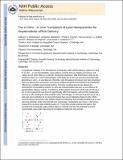In Vitro-In Vivo Translation of Lipid Nanoparticles for Hepatocellular siRNA Delivery
Author(s)
Matthews, Jonathan; Chang, Philip H.; Niroui, Farnaz; Severgnini, Mariano; Whitehead, Kathryn Ann; Dorkin, Joseph Robert; Anderson, Daniel Griffith; ... Show more Show less
DownloadAnderson_In vitro.pdf (1.305Mb)
OPEN_ACCESS_POLICY
Open Access Policy
Creative Commons Attribution-Noncommercial-Share Alike
Terms of use
Metadata
Show full item recordAbstract
A significant challenge in the development of clinically viable siRNA delivery systems is a lack of in vitro–in vivo translatability: many delivery vehicles that are initially promising in cell culture do not retain efficacy in animals. Despite its importance, little information exists on the predictive nature of in vitro methodologies, most likely due to the cost and time associated with generating in vitro–in vivo data sets. Recently, high-throughput techniques have been developed that have allowed the examination of hundreds of lipid nanoparticle formulations for transfection efficiency in multiple experimental systems. The large resulting data set has allowed the development of correlations between in vitro and characterization data and in vivo efficacy for hepatocellular delivery vehicles. Consistency of formulation technique and the type of cell used for in vitro experiments was found to significantly affect correlations, with primary hepatocytes and HeLa cells yielding the most predictive data. Interestingly, in vitro data acquired using HeLa cells were more predictive of in vivo performance than mouse hepatoma Hepa1-6 cells. Of the characterization parameters, only siRNA entrapment efficiency was partially predictive of in vivo silencing potential, while zeta-potential and, surprisingly, nanoparticle size (when <300 nm) as measured by dynamic light scattering were not. These data provide guiding principles in the development of clinically viable siRNA delivery materials and have the potential to reduce experimental costs while improving the translation of materials into animals.
Date issued
2012-07Department
Harvard University--MIT Division of Health Sciences and Technology; Massachusetts Institute of Technology. Department of Biology; Massachusetts Institute of Technology. Department of Chemical Engineering; Massachusetts Institute of Technology. Department of Electrical Engineering and Computer Science; Koch Institute for Integrative Cancer Research at MITJournal
ACS Nano
Publisher
American Chemical Society (ACS)
Citation
Whitehead, Kathryn A., Jonathan Matthews, Philip H. Chang, Farnaz Niroui, J. Robert Dorkin, Mariano Severgnini, and Daniel G. Anderson. “In Vitro – In Vivo Translation of Lipid Nanoparticles for Hepatocellular siRNA Delivery.” ACS Nano 6, no. 8 (August 28, 2012): 6922–6929.
Version: Author's final manuscript
ISSN
1936-0851
1936-086X